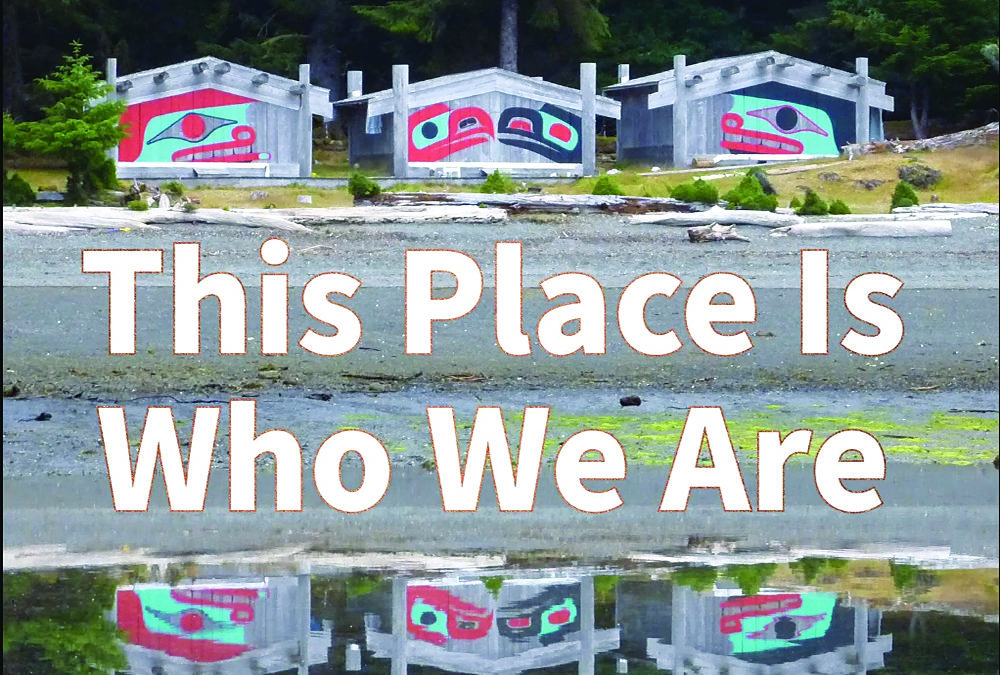Rachelle Stein-Wotten
Local Journalism Initiative Reporter, Gabriola Sounder
Katherine Palmer Gordon’s new book lifts up the voices of people whose stories date back to the north and central coast for thousands of years, stories that offer lessons for how to reframe the way land, and those who live on it, are treated today.
This Place is Who We Are: Stories of Indigenous Leadership, Resilience, and Connection to Homelands, published by Harbour Publishing, is a compilation of 10 stories profiling individuals from some of the over two dozen Indigenous communities of the north and central coast of what is commonly known as British Columbia.
Palmer Gordon spent five years building the collection, connecting with and listening to Indigenous people young and old share their perspectives on their connection to their homelands, from revitalizing languages to reclaiming cultural practices and lands, like millennial old knowledge on caring for the earth that has come to be known in western governmental language as ecosystem-based management.
“I was looking at all of these things – there’s actually some fascinating stories to share and very inspirational and hopeful” in relation to matters like the climate crisis, Palmer Gordon said. “If we look to the way Indigenous peoples’ have engaged with their environment and practiced sustainable resource management and human wellbeing over 700 generations … then there’s a lot to learn from that because you don’t survive and thrive for 14,000 years if you aren’t doing something right.”
The book came about through a conversation with Coast Funds, a conservation financing organization for First Nations in the north and central coast region that Palmer Gordon previously worked with for a number of years. Coast Funds helped with funding for commissioning many of the photographs that appear throughout the book and found a sponsor for some of Palmer Gordon’s writing time and formally supported the author in connecting her with some of the individuals in the book that she didn’t already know personally. They also pre-purchased 1,000 copies to share with people whose stories are in the book and for distribution to the communities profiled.
Narrowing down what to ultimately include in the book came down to wanting to “show the diversity in the ways in which [people] connect to their lands,” she said, as the lands themselves, from X̱aayda Gwaay (Haida Gwaii) to the Wei Wai Kum community in Campbell River, are diverse.
From Palmer Gordon’s perspective, two core themes emerged in the collection. First, “the land you’re on dictates how you relate to that land and it dictates your relationship with it and with each other,” including laws and protocols and nation-to-nation relations; and second, “to think about the fact that these civilizations do go back 10,000 years, 14,000 years … and the brilliance of these systems that developed out of that, … how every aspect of life actually had a very practical meaning to it” that carried knowledge forward and held communities together.
As a non-indigenous person, Palmer Gordon was careful to avoid inserting her own interpretations into the writing.
“My job as a writer is to amplify their voices and make this be all about them, not about me.” Each person she worked with received a story plan and a commitment in writing that nothing would be published without their full approval. She has also committed to come back to every community and help out in any way as a thank you.
“It is all about relationships and reciprocity … it’s about making sure that everything is about uplifting each other.
“For me the reciprocity was learning – gosh, I learned so much over the last four years – but also the beautiful relationships.”
The stories included are ones of resilience and inspiration, something Palmer Gordon was keen to amplify given the dark realities of much of the contemporary moment, but conveying those messages of hope couldn’t be done without addressing the sweeping impacts of European colonization, she learned.
“I very much wanted this book to be about the future – forward-facing and inspirational and hopeful – but of course everybody I talked to had to talk about the impacts of colonization because it is such a fundamental part of who they are and where they are and what they’re doing as humans beings to move forward and for their future generations.
“One person put it beautifully: you can’t set the table for the future until you clear it of the past.”
The deliberate efforts by Canadian governments to wipe out Indigenous peoples’ culture and knowledge impacts everyone on these lands today, Palmer Gordon noted. “If we had lost that all together, we would have no book like this, we would have no knowledge about those incredible sustainable ways of managing our world and ourselves and that hit me in the face like a tidal wave as I was talking to people.”
Because those efforts didn’t fully succeed, much of that knowledge remains, a spark of light for Palmer Gordon. “What these people are all showing us is hope and it’s not too late. We really could do so much better and we could do it overnight.”
The author will read from This Place is Who We Are on Sept. 9 at 1 p.m. at the Gabriola Library at an event hosted by Page’s Bookstore.





Recent Comments